COMM-ORG Papers, Volume 16, 2010
Community Organizing in Europe: A Travel Blog
Dave Beckwith
dbeckwith@needmorfund.org
Contents
Introduction
About Me
Entries
1. Starting
2. The Plan
3. Getting Ready
4. February 3
5. First Workshop!
6. Poland is Pennsylvania!
7. Tuesday week 2
8.
February 9
9. Fat Thursday
10. February 12
11.
February 13 in Snowy Sklarska Poreba
12.
Valentine's Day in the Polish Mountains
13. Czech Republic!
14. Walking Prague
What I've Learned
Other Photos
Discuss this Paper (opens in new window)
Introduction
This is the web log of Dave Beckwith and his wife, Lindsay Potts. They visited Eastern Europe in February of 2010 at the invitation of the European Community Organizing Network, with the support of the Mott Foundation. Dave is the Executive Director of the Needmor Fund. Dave was invited to meet with organizers and their allies in Hungary, Slovakia and Poland, to do workshops in Poland and to consult with the ECON network.
The blog can be found at http://econdave.blogspot.com
Dave's Community Organizing, People Power from the Grassroots can be found in English or Slovak.
About Me
Executive Director of The Needmor Fund, community organizer since 1971, father, husband, singer, cigar smoker, learner and occasionally teacher.
Links:
The Needmor Fund: http://www.needmorfund.org
My profile on The Organizer Genealogy site: http://www.organizergenealogy.org/dbeckwith
Entries
1. Starting
January 12, 2010
Well, three weeks from departure - actually, a day short of three
weeks. Meeting new people, seeing new places - learning, teaching,
and organizing in new places with new challenges of language,
culture, context...very exciting. We'll see.
I hope to use
this blog to chronicle what I learn, what new questions arise, and
what occurs to me as important. I'll post the occasional photo, and
Lindsay and I will share the sights, sounds, flavors and stories.
To
quote my old friend, Tim Sampson....Onward!
Next...the task,
the context, some details of schedule and some thoughts...later.
2. The Plan
So here's the plan as of January 15:
February 1, Monday at
9 pm - we depart Detroit, fly to Paris then to Budapest. We arrive
Tuesday around 6, and stay at the Gellert Hotel (roman baths, hot
springs, and it's where we stayed in 1978!)
Wednesday the 3rd
to Friday the 5th - Chuck Hirt picks us up and takes us to Banska
Bystrica in Slovakia. He's head of the Center for Community
Organizing (http://cko.sk/) and the
organizer of the whole operation. We get oriented and organized, meet
with the staff from Slovakia, and generally get started.
Saturday
and Sunday the 6th and 7th - travel to Warsaw, likely stay over in
Krakow. For all this travel, we'll have a car and a colleague who can
act as a guide and navigator.
Monday and Tuesday - Dave does
training with leaders from the Polish host organization from all over
the country. The group is called SLLGO - The Association of Leaders
of Local Civic Groups (SLLGO) and their English language website is
here:
http://www.lgo.pl/english/
Wednesday the 10th we travel to
Szczecin (NW corner, near the German border and the Baltic)for two
days of training with the local group on Wednesday and Thursday the
17th and 18th.
Friday the 12th travel to Szklarska Poreba in
the SW, a reputed Winter Wonderland, for training with the local
affiliate on Sunday and Monday.
Monday the 15th, travel to
Prague for a day or so of R&R, then to Bratislava to meet with
Chuck Hirt and Paul Cromwell and other staff from the ECON
network.
A day of meetings with the CCO staff in Banska
Bistrica on Thursday the 18th, then back to Budapest.
We'll
be in Budapest from Friday the 19th until we leave on Monday the
23rd. We will certainly connect with old friends there, and with some
folks who are part of the ECON network, but not sure whether there
will be a formal meeting.
and home again early Tuesday
morning!
Next post - more on plans.
3. Getting Ready
January 29, 2010
Last official day at the office; departing Monday evening. The
Needmor books have arrived at Chuck Hirt's in Slovakia, along with
Joe Szakos books (the excellent We Make Change, which profiles
organizers, what we do and why), and it's getting pretty much
inevitable. Thinking about what I want to learn from this trip, as
well as what I want to teach.
To learn, I think, what's the
essence, the unchangeable center - this is what separates organizing
from all the other stuff you could do. To further explore the edges
of that, the frontiers, where the work is different - and it's always
different - but the essence is in place.
I've written about
this before, and I've worked closer to the boundaries. At the Center
for Community Change I specialized, for a while, in community
development organizations and service agencies who had a commitment
to organizing, and I've visited folks in Canada and Australia whose
work is very different from what I'm used to.
The trick here
is not to fall back on slogans or ideology or simple formulas. The
key is to find what I once called the Soul Test. Here's the intro to
something that Randy Stoecker (of the excellent website
http://comm-org.wisc.edu) and I wrote together:
COMMUNITY
ORGANIZING: SOUL AND SUBSTANCE
Dave Beckwith and Randy
Stoecker
The Soul Test
The Soul of Organizing is
people. An organizer might be paid or work as a volunteer. The group
could start as part of a master plan hatched in a smoke filled room
or out of a 'spontaneous' community reaction to a crisis like a toxic
waste dump. They might base their work on house by house prayer
groups or cells of clandestine conspirators. the ultimate goal could
be the preservation of the Hopi language and culture or the overthrow
of the real estate tax based system for financing public education.
Organizers can differ on strategy, tactics, even on what seem to be
base values. However, all organizers believe in people, in the
ability of regular folks to guide their lives, to speak for
themselves, to learn the world and how to make it work better.
The Soul of Organizing creates a lot of problems. The people that have the power now tend to misunderstand when others want to share that power. There are usually forces or people that benefit from the imbalance of power: politicians don't always want to hear from the victims of their help; bureaucrats that 'know best' would rather see their clients as abstract concepts than real, live, complicated beings with opinions on how they want to be helped. Business has its own dynamic, and profit, and especially the short term bottom line kind can be an all too visible hand. The Soul of Organizing says to these folks "STOP"!! We want a say in this! We're people, too, and you WILL listen to us!
The soul of organizing creates a litmus test, too. It is not our purpose to create a hard and fast definition - although we offer some guidelines. Generally, whenever folks get together for mutual aid, common support, planning for the future and to make a point, that's great, and we'll share the name, "organizing". Everyone who cares to use the term, though, is open to the Soul Test. Does this work include people, does it ennoble them, does it allow people with a problem to participate in its solution, does it make room for them at the decision making table, and does it actually lead to an improvement in their lives?
We urge caution in applying the test, especially when the powerful--the White, the moneyed, the politically connected--apply the test to the powerless. Most variations from the 'pure' are the result of folks' understanding of what's possible and what's important. If you don't have to lie down on a park bench at night, don't be too quick to judge the choices made by those who do.
For those in the struggle, though, the Soul Test can help build better organizations. We will have some suggestions on how to use it later.
4. February 3
Lindsay Says:
Quick revisit to Budapest featured the much-faded
glory of the Gellert Hotel but since we don’t do luxury, it was
really quite nice plus the thermal baths were just the ticket for
achy travelers. Nilda Bullain was certainly not faded; I recognized
her beautiful long, dark hair from behind, even after 20
years.
Crossing into Slovakia, I remarked that a small town we
were passing through seemed abandoned. Chuck said Slovaks work many
hours, then keep to themselves. “But the shutters are pulled!”
“Well, if every fifth person was an informer, you learned to be
very private and those habits remain.” I can’t wait to
learn how one organizes here.
Dave Says;
After
soul-killing exhaustion of sleepless transatlantic flight (I long to
cross by ship again!) we woke up in the Gellert Hotel, swam around in
the healing waters and were refreshed!
Nilda Bullain stayed
with us in Toledo TWENTY YEARS ago – she’s a leader in
Europe and beyond in the effort to build a legal and political
infrastructure that can permit and facilitate non-profits and a
voluntary sector. LOTS of possibilities for future conversations.
And lots and lots of surprise overlaps in this big and crazy
world. Here are two: Nilda stayed with us twenty years ago when she
was in Ohio with a project to teach the skills of democracy. AND
Chuck Hirt, the Executive Director of the Central and East European
Citizens Network and an organizer of the ECON network, who picked us
up from lunch with Nilda….knows her and worked closely with
her six years ago!
Here’s another…as we drove
through snowcovered fields and villages between Budapest and Brinska
Bistrica, Slovakia where Chuck lives, we discovered that he is very
close friends with the Cincinnati Ohio cartoonist Jim Borgman, whose house
was bought by our good friends Mike Marcotte and Mary Claire
Rietz!
(cue the Disney music…”it’s a small
world after all….”)
I’ll try a couple
photos…us with Chuck’s delightful high school junior
daughter Zuska (sp?) at the Slovak restaurant tonite (venison; cherry
sauce; cabbage; potato noodles….) and Lindsay on the balcony
of our room in Budapest, looking at the Danube.
PLEASE COMMENT – it’s like a postcard from home…
5. First workshop!
February 5, 2010
Twenty four leaders from an organizing project in a giant housing
complex in the town of Zvolen. Started with magnificent pizza at the
restaurant owned by one of the leaders and his wife, who is the
organizer there - Nano and Sanja Nikolov, who came here from Croatia
and are passionate, open hearted, enthusiastic and totally committed.
This sprawling "neighborhood" of 12,000 families is a relic
of the "bad old days" - the socialist times, the Soviet era
- they built towers with very little attention to common space, green
space or community. They've been privatized, so each building has an
association and they chose a management company so there are a jumble
of landlords to deal with. The underlying land belongs to different
people altogether - getting anything done is ten times more complex
than it needs to be. They've won some stuff already - I walked on the
Sidewalk of Victory, which they got rebuilt by protest and demand. I
presented on three questions: Apathy (how do we get folks involved)
Power (how do we get some, how much do we have) and Building an
Organization. More on this later, perhaps, but it went well, I was
able to cheer them up (We only have 40 people! But that's great!) and
invented a new metaphor for building an organization (The issues and
campaigns are like a pizza, the organization is the restaurant).
Delighted to have half the green book translated into Slovak.
I
presented in English, of course, and was translated by the organizer,
Kajo Zboril. He was great, fast and very good on the organizing
nuance. He was a great sport, too -I told the story of how, when I
complained to my first organizing mentor that the people were lazy
and apathetic and didn't want to be organized, he said NEVER blame
the people! It's YOUR job to figure out how to motivate them!"
When I tell the story, I bang my hand on the table, right after
NEVER! and I asked Kajo to include the BANG in his translation, which
he did, with feeling!
Pictures later, stories coming - I fried
the power adaptor, so the laptop is out of service.
Lindsay's
a great hit, too - her winning way with people, her curiosity and
openness and her experience in politics, community building and
organizing.
Next - three workshops in Poland. Onward!
6. Poland is Pennsylvania!
February 7, 2010

(With
castles)
Ok, this is a picture of us with our old friend Nilda
from Budapest, and our main sponsor/host, Chuck Hirt of the CKO
organization and ECON.
Tonight we're in Warsaw, in a tidy two
bedroom apartment across the square from the Castle in the Old City
(actually all rebuilt in the 1950's...). We traveled yesterday from
Banska Bystrica in Slovakia, up through the Carpathian Mountains of
Slovakia and a corner of the Czech Republic and into Poland.
Delightful to be driving with Kajo through his home town - he could
tell stories of food, family and camping in castle ruins, etc. and he
knew just where to stop at the roadside stand for this smoked
sheepsmilk stringcheese. As Lindsay points out, like shoelace
licorice only WOW!
Stopped for a vegetarian lunch and a quick
howdy-do with a young civic acivist in Katowice by the name of
Grzegorz...turned into six hours of enthusiasm, stories, ideas,
plans, questions, answers and an impromptu tour that included the
railroad station they saved with protest and a miners town where the
coal mine is down at 1200 meters. We saw this incredible community of
brick flats and commercial buildings and then the nearby miners'
cottages - showed us two dramatically different approaches to company
town development, and stunning examples of architecture and community
design. Pictures later...In our talks, we got to the question I'm
centering in on here - who is "US"? Who do you mean when
you say "we're working for better transparency" or "we're
trying to get the City to listen". This question gets us quickly
to the membership dilemma - in the former Eastern bloc ("Newly
Independent States") the ideas of voluntary associations and
membership have been poisoned by their misuse by the soviets and
allied governments. So what do you do about building an organization?
He said at one point that they have 23 members (legally required for
registration) and another 40 people who are strongly committed and
involved and he has assumed they're not interested in being members
but hasn't asked. Hmmm.
Thence on to Krakow, where we stayed
in a pension in the Jewish District, ate at a Klezmer Restaurant
(chicken schnitzel and potato pancakes with applesauce and mushroom
soup from heaven!) then whisky, brandy and mineral water and cigars
at a french-y cafe. ahhhh.
Sunday morning off to the city
square and castle Wawel (vahvell) and geez the city square market
building was under wraps with renovation but I fell in love with
these goofy figures on the roof - gargoyles? grotesques? somebody?
and we went in to the Church of the Assumption of Mary for an eyeful
of dramatic beauty and abundant art and painted walls and ceilings.
When church started, a choir of men with bass viol voices. The castle
and its church (with a statue of the former bishop here, who later
got a bigger job in Rome...) was also fascinating, with tapestries
and paintings of the Big Battles (Tatar invasions, Teutonic knights)
and a great view of the city and surrounding plains. Also playful
carved heads on the ceiling of one room, looked like they could
easily jump out as animated cartoon figures direct from the mid
sixteenth century!
On the ride north, I watched as the forest
came and went, the farm fields waxed and waned, the factories smoked
or sat idle, the coal fired plants and the nuclear power cooling
towers steamed and I thought - Pennsylvania with castles!
Met
up with the Warsaw team - delightful, serious, fun, intent and ready
to prepare in any way that makes it better. Example - the Green Book
(People Power from the Grassroots) is translated (!) and when I
called it the Green Book, they (Kasia...more later) insisted that
they will reprint the first page so the cover will be green. Nice
people - we expect FORTY tomorrow (original estimate 15 - 20).
Anyways, to bed and to work tomorrow!
7. Tuesday week 2
February 8, 2010
Lindsay writes:
Dave and Kajo off to 2nd day of Warsaw training. I'm torn - the Poster Gallery at the castle museum 7 km from town? More likely Warsaw Uprising and Museum of Caricature, then late afternoon with Dave, perhaps Kasia, Kajo, will explore a cemetery. Yesterday tramped 4 hours in Praga - Toledoans take note, east side of Wisla River and same attitudes both directions - "those people might harm us if we venture across the river"; "we don't need you snobs, perhaps we will bop you over the head from time to time so you know your place". Some lovely old buildings to N of Solidarity Blvd, some under rehab, I assume not for locals. Cheap rent has drawn young artists to former warehouses so a pretty lively scene - alas even they seem to follow the rule - nothing open to tourists on Mondays. A gallery owner found me wandering among buildings at Magazyn Praga - a mall of art studios and workshops though not under one roof and certainly no amenities - and took pity. She'd just taken down but not removed work from an exhibit of recent graduates so I could turn the canvases to the light and gaze to my heart's content.
8. February 9
Lindsay’s Blog
Warsaw’s Catholic churches are
apparently arranged around types of people so near us in Castle
Square is a young adults’ church where many hold their
weddings; we passed the military church where commemorations are held
and the bishop (?) is powerful; we passed the artists and writers
church – the homilies speak to these groups so attendance often
breaks out along these lines.
So, who are the 11 young artists
at the Magazyn Praga gallery – inward-looking, certainly not
joyful but also not jaded or ironic. Surprisingly, all the work
involved putting a brush or pen or pencil to paper, although some
also incorporated photography and computer graphics. And I liked a
few of them, getting a personal challenge or pleasure.
I ate
horse meat for the first time last night! Not much, but it was
carpaccio so scary but also not so much chance of a really weird
texture.
Dave adds:
GREAT to get back to doing training –
two days seemed a great yawning tunnel of time before we started.
Then we get in the room – 25 wonderful people, wide ranging
work, young and medium young, strong willed and open minded…A
great translator, Magdalena had lived and studied in Montreal and
works with NGO’s so she was aware and sensitive to the message
as well as the words. Agnieshka and Karol from the Association super
efficient and on-the-job in setting stuff up, copying pictures and
evaluations, running around with newsprint sheets. The Association of
Local Leaders has a close working relationship with OMB Watch and
Public Citizen and Common Cause, and they are steadily approaching a
role in supporting the growing network of folks in Poland who are
doing – or want to do – organizing. Groups ranged widely.
There was a tenants’ association (3 younger working class men
and a big older guy, veteran of Solidarity and street protest,
fighting to protect eviction victims and challenge the privatization
of housing here). A rural town group focused on community involvement
and good government, five leaders including an earnest young
accountant and his bright young journalist wife, who publish a
newspaper locally and are struggling with how to strengthen their
base and widen their leadership. A young self described anarchist
woman, trying to build an alliance within a labor union that centers
on women’s rights. Great questions – how to manage
conflict within the community, how to keep meetings lively, how to
sort leader/organizer roles. Incredible spirit, good humor. And only
two days!
After the training (and
a good old fashioned 45 minute debrief!) we went on a brisk (9 below
zero Celsius – what’s that in US dollars?) walking tour,
guided by an attorney from the association who used to be a certified
guide. I was hit hard by what we saw. 90% of this area (and 65% of
all Warsaw) was flattened in the Second World War, the old parts
rebuilt, and monuments all over to various massacres, revolts,
uprisings and heroic resistance. In the old Jewish Ghetto, the guide
said “we are walking on the ruins here…literally. The
cellars were filled in and the bricks leveled and the surface was
about 2 meters higher when these streets were built.” And the
monument to the Ghetto Uprising, built from stone brought in (but
never carved) by the Germans to build a monument to Hitler. And the
mound with a blunt stone commemorating the spot where the last,
cornered hundred fighters from the Jewish resistance committed
suicide, imitating the Jews of Masada under Roman attack. “This
building on the left (which I was touching as we passed) was SS
headquarters. Across the street there, the rail station to
Auschwitz.” The heroism, the evil, the horror, the sweep and
re-sweep of history, the sheer awful ugly and beautiful drama of it.
I walked and sniffed and reeled from the thoughts and emotions.
Tomorrow, off to Szczecin for Thursday/Friday workshops.
In a comment on this post, Lance Evoy of Montreal said...
“Dave, your experience walking across the ruins of the Ghetto reminded me of Berthold Brecht's poem:
The World's One Hope
Is oppression as old as the
moss around ponds?
The moss around ponds is not avoidable.
Perhaps
everything I see is natural, and I am sick and want to remove
what
cannot be removed?
I have read songs of the Egyptians, of their
men who built the pyramids. They complained of their loads and asked
when oppression would cease. That's four thousand years
ago.
Oppression, it would seem, is like the moss and
unavoidable.
When a child is about to be run down by a car one
pulls it on to the pavement.
Not the kindly man does that, to whom
they put up monuments.
Anyone pulls the child away from the
car.
but here many have been run down, and many pass by and do
nothing of the sort.
Is that because it's so many who are
suffering? Should one not help them all the more because they are
many? One helps them less. Even the kindly walk past and after that
are as kindly as ever they were before walking past.
The more there are
suffering, then, the more natural their sufferings appear. Who wants
to prevent the fishes in the sea from getting wet?
And the
suffering themselves share this callousness towards themselves and
are lacking kindness towards themselves.
It is terrible that human
beings so easily put up with existing conditions, not only with the
sufferings of strangers but also with their own.
All those who
have thought about the bad state of things refuse to appeal to the
compassion of one group of people for another. But the compassion of
the oppressed for the oppressed is indispensable.
It is the
world's one hope.
9. Fat Thursday
February 11, 2010
Dave says:
today is Fat Thursday! In Poland, they celebrate the
beginning of Lent by eating up all the fat, so at the training in
Szczecin today we had (sounds like) Punchki - which we know from
Toledo's Polish American community. Woohoo!
25 mostly young
people here, journalists, youth advocates, the association of law
students, rural and urban folks - LOTS of interest in how the tools
of community organizing can come in to their work.
More
later.
Lindsay says:
Today got totally confused about who
took over what when and who laid ruin to Szczecin after/during which
war. Beginning to sympathize with the Polish feeling of resentment to
much of the rest of the world. Visited the Pomeranian Dukes' Castle
where Boleslaus the Wrymouthed resided in the early 12th C. Trying to
understand the Gryfits and relationship to griffins which I thought
were just from fairy tales.
10. February 12
Another two-day training done - what a gas! Young people...I
usually begin my personal story by asking who was alive in 1971 when
I started organizing - only two of the twenty four! A core from the
host group, a local civil society group that supports leadership
training and community based organizations. Local staff from the
national sponsors, the Association of Local Leaders. I continue to be
impressed by these tough, open hearted, smart and dedicated young
people - Szimon, the local staff here in Szczecin (try this sh - ch -
ech - in) turned 30 today, his wife works with him and they just
found out they're expecting! Anka came from the Warsaw office - she
has great English, and couldn't attend the training in Warsaw - she's
been a sort of buddy to us, with strong opinions, clearly expressed -
not so sure she's happy with the conventional wisdom of the official
story on Polish history - for example, she points out that the
rebuilding of Warsaw after the war included tearing down intact
buildings in the former German areas of Poland (like here) and using
the bricks in the capital. They took trees, too!
I only did
three sort of touristy things - a walk along the bastion in front of
the palace by the port (a real working port - reminded me of Toledo);
a walk at dusk through the big town church with its chapels dedicated
to saints and Mary and to the holocaust victims (the metal screen was
styled as barbed wire) and Solidarity and railroad workers and
merchant marine and shipbuilders. And last night we slogged for what
seemed miles through two sections of a tunnel system built under the
main train station - the first used as air raid shelter during WWII
and the second prepared for retreat in the event of nuclear attack.
Both had lots of artifacts and sound effects - and it struck me hard
the stupidity and brutality of war, and the human scale. I saw the
paranoia propaganda that was so familiar in my childhood in the 50's
and sixties in the US - from the viewpoint of the "other side".
And in there a room with artifacts and story and photos of Solidarity
- very big here in this shipbuilding and merchant city. Those
newsletters, obviously mimeographed - I heard in those days of the vw
buses they outfitted with mimeos and kept in motion to outwit
government opposition to their labor and anti-corruption and finally
pro-democracy organizing. Pictures of buildings in the downtown, on
fire after a Solidarnosc rally - included the building our training
was held in! I was swept with the knowledge of the heroism and
dramatic inventiveness of those who fight for good things everywhere.
(there I go again)
Training went well - three young guys came
by bus from Gdansk, where they run a community project that includes
a web access deal and grassroots outreach - they struggled and
searched and questioned and finally admitted they had to make some
big decisions - to be "journalists" and service providers
or to make the leap and become organizers. Another guy, in the
evaluation round, said "I got hope from this - I can't wait to
put it to work!
On to what's been described as the Aspen of
Poland - Sklarska Poremba, and one last 2day workshop - but first, a
little sleep!
LANGUAGE NOTE - my new Polish phrase, for
"one-on-ones" - oko w oko...pronounced oako-voako - it
means eye to eye!
11. February 13 in Snowy Sklarska Poreba

What
a drive to Sklarska Poreba. Climbing up to this town at 1300
(correction: 850) meters near the Czech border by the Kemienna River
Valley on winding road through small towns, mostly picturesque with
ruins of castles in some. Then through forest of snow-covered pines
and what we think are larch trees - the snow looks feathery on the
branches, like the snow flakes are resting. The town stretches over
the mountain with a lower part that seems to be where regular life
takes place and the upper part by the ski resort which is packed with
visitors, especially now, a school break. Dave drove bravely,
negotiating the sheet ice portions of road with aplomb. Staying in a
penzione next to (by snow covered field) the training site, a former
school now used as a social service site. The penzione is beautifully
retrofitted with sleeping lofts and sponge painted (?) walls,
paintings all around, apparently by the owner.
Dave says:
What
a day - left Szczecin around nine, drove in circles trying to get the
GPS to help...finally got ourselves found and drove off and quickly
crossed the almost non-existent border with Germany - and zip! the
road was brand new, smooth, snow swept clean, snowbanks scraped back
to the widest spot and we zoomed along at 120 - 140 kph (I'm not sure
how fast that is in fahrenheit). Had one coffee stop to spend euros
and use my German. At the Polish border, the road turned
pothole-ridden again quickly. An hour or so in, we turned up into the
country, then - as Lindsay says - into a fantastical wonderland of
snow on pines and birches. I kept saying "nobody would believe
it". Pictures later.
Thinking about a blogpost about
food. Would this lower us in your estimation? Would we seem shallow
and touristic? A preview - among our favorites - the mushroom soup in
the klezmer restaurant in Krakow and the zurek - a soup made with a
sour rye flavor, with potatoes and white sausage in a waterfront cafe
called Columbus (as in Christopher) in Szczecin. Strangest but still
good - the horsemeat carpaccio with lemon and oil in the Lvov
(Ukranian) restaurant in Warsaw. (The picture above is us outside the
restaurant, post-horsemeat. Our hosts - the smart, tough young women
and men from the Alliance of Local Leaders.)
Let me know if we
should do a "restaurants and dishes".
12. Valentine's Day in the Polish Mountains
February 14, 2010

The
picture shows Miro Ragac, organizer with the Center for Community
Organizing in Slovakia and our bodyguard, guide, mentor and navigator
on the second half of the Polish journey; Irena, local volunteer and
very sharp, clear on what organizing is, a key actor in the local
work; me and Lindsay enjoying Valentine's Day in the snow and Marzena
- the local host and active in the Association of Local
Leaders.
Dave writes:
Day One of this training - really
more of a consultation. We're in a beautiful village that sprawls all
over these hills, with three or four main centers and a region of
older, less touristic and more farm or industrial oriented towns.
After an intro session marked by bold interruptions and lively
engagement - these are older, wiser, more experienced folk and they
know what they know - we addressed the question: do you want to build
a powerful organization in this community? After a very enlightening
scramble - one community? three? one group? does that mean we abandon
the groups we have? who's the organizer? what's the issue? They
settled on one group, geography very clear, and the issues, organizer,
and shape and form to be worked out over time...Then on to a rough
version power analysis - who's here? what do they do? What
institutions do we have? Who has power? More tomorrow.
Then to
a bit of touring - an incredible frozen falls (picture above -
reminded us of New Hampshire) and a yummy meal. Walked around in the
town a bit - lots of tourist shops, some serious ski and snow sports,
and mineral and gem shops - most of it from Japan and Thailand, but
we managed to find quartz crystals mined nearby - it's a famous
mineral mining center.
From Lindsay: Sorry, photo's
background askew. Town is full of diesel fumes - low cloud cover,
definitely a worse smell than the wood and coal smoke of the towns as
we drove up to Skarskla Poreba. Was going to do the food post (just
in case you travel this way) but too many blanks - what was that
resto called, what was that soup named? Will try to remember to quiz
Miro tomorrow to fill in the blanks and try later. Daughter Schuyler,
for one, is dying to know.
13. Czech Republic!
February 15, 2010

Sklarska
Poreba Class of 2010
Sitting in the bar at our new home, a
tidy hotel in Prague. Just walked to the old castle on the river
called Vysehrad - high castle - and looked out over the river at the
city lights, the really big castle across the river, just beautiful.
Second day's over of our third - and last formal - workshop.
See the picture above - very messy, not "training" at all,
but a lively, freewheeling exploration of what I mean by real
organizing, what folks are already working on, how they could get
more people and more power out of it - and in the end, really
exciting because it was so real. We ended up strategizing on how the
folks in one part of the community could get the director of the
community center to open it up more hours, weekends, for more
activities - perhaps a weekly 'festival of the locked-out' with
events outside that couldn't get permission to go inside? I asked
Miro to give an overview of the issue process - listen, research,
action - and tell the story of the Sidewalk of Victory from Zvolen,
Slovakia - it was a big hit, he was engaging and clear, and the folks
really got it!
Tomorrow pure touring in this classic old city,
then on to Bratislava to meet up with Paul Cromwell and Chuck Hirt
and Kajo to debrief.
More later on Food and on What I've Learned.
14. Walking Prague
February 16, 2010


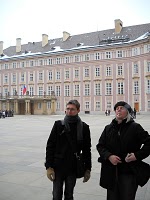
The
statue of Wenceslaus in the long square where the big rallies were
held, and the square where the inauguration took place. Plus me,
singing to the Commendatore.
Very briefly...Miro took
us on a walking tour of Prague today - took the tram up to the Prague
Castle and wandered the streets and cafes to the top of Wenceslaus
Square - cold but informative, beautiful buildings, and a couple of
refreshing stops for food and drink.
For me, highlights
included the statue at the top of the square where the big rallies of
the Velvet Revolution made change inevitable, and the big square
where the newly elected Vaclav Havel was inaugurated, the victory
party to top all victory parties!
And of course the opera
house where Mozart debuted his new work, Don Giovanni!
The
pictures may speak for themselves - more later, including a Top Ten
Cakes spot that Miro knew!
Extra organizer points to him for
being a cheerful, informative guide and a great companion! (and we
actually got to talk lots of work stuff in between castles and
churches). He's an impressive young man. He really liked training in
Sklarska - I predict he'll be good at it!
Tomorrow, we meet up
in Bratislava.
What I've Learned
February 18, 2010

Lindsay
and our friend Miro at the cafe in Prague.
I said at the start
of this adventure that I want to learn at least as much as I teach.
We’re almost at the end of the work, so I thought I’d
take a first cut at what I’ve learned.
Here’s
what I said at the start:
“Thinking about what I want to
learn from this trip, as well as what I want to teach. To learn, I
think, what the essence, the unchangeable center is - this is what
separates organizing from all the other stuff you could do. To
further explore the edges of that, the frontiers, where the work is
different - and it's always different - but the essence is in
place.”
So here’s what I’ve learned:
First,
about myself. I like to train. I really like to do training. There’s
the thrill of danger – will it work? Can I make sense to this
new group of people? Will it make any difference? And then, if you’re
lucky, the “click” when folks get it – when it does
work. It’s intense, and three two-day workshops in a strange
language, each with a different collection of folks in radically
different settings – it’s an Extreme Sport. But I liked
it.
Next, about the work. Every place has good people, trying
their best to make it better in spite of the odds. I learn this
everywhere I go, in the States, in Canada, in Australia. It’s
still an exhilarating lesson.
Clearly, organizing “the
US way” will never work here – but the core truths, the
important principles, the essentials are powerful, important and
apply here. For example, The “Ten Rules” from my little
green book, which include brilliant obviosities (not a word, I know)
like “Nobody will come out unless they know about the meeting”,
really connected for people. They had their own ways, maybe not phone
lists or printed flyers, but intentional and accountable and intense
outreach is a step that nobody can skip, and it’s easily
translated into the local ways.
Words matter – not just
the literal translation, but understanding the context and the
meaning of the literal translation. It takes listening and time but
it’s essential. You have to know the difference between a
disagreement over the core principles and the wrong word. Hard
lesson: I said to somebody at dinner in rural Poland, meaning the
most positive of compliments – “You’ve been a
wonderful collaborator.” Everybody’s face fell, and I
remembered that collaborators were those who helped the Nazis against
their own people. They graciously explained, but I knew I had stepped
in the smelly stuff.
The most critical of these “word”
issues was my favorite little mnemonic – “Organizers
Organize Organizations”. I stole this long ago from Heather
Booth of the Midwest Academy (I think), and it captures the key
question for me – what are you building? I was delighted to
discover that in both Slovak and Polish the acronym is the same –
OOO. But at each of the three sessions in Poland I was met with
concerns, objections, misunderstandings and disagreements –
including from folks who seemed to “get” most of the
other points about organizing. In the end, I found that the
implications of the word for “organization” were very
clearly those of an agency, a corporation, a formal legal structure.
What I seemed to be saying was “organizers build corporations”.
Much better would be something like “community organizers build
community groups”. I’ll be talking with the translators
for help in the re-write.
There’s a difference between
backing down on core concepts and adapting to the context. Another
example – Slawek, the translator in Szczecin, explained that
after the end of communism, the vultures and scam artists descended
on Poland, and one was Amway – lots of people believed the
hype, went door-to-door pestering their neighbors and friends and
lost lots and lots of money on product they bought but couldn’t
sell. So calling what we do to reach out “door-to-door”
conjures up those horrible associations. The poetic sounding “oko
w oko” (said “ohkoh vohcoh”) works better –
it means “eye to eye”.
Finally, money matters.
Like everywhere, good people who speak out on one issue and win,
learn and want to keep going and building power – eventually
they figure out that you have more power if you hire somebody to
specialize as the organizer. Where the resources to do that are
scarce – whether in Poland or Slovakia or Alabama – you
end up with a bit of government money and a church grant and a bit of
dues – and the source of the money can distort the work. The
philanthropic sector here – in all the countries I’ve
seen – is very limited, and the legal and tax context works
against effective local grassroots fundraising. It’s not
impossible, but it’s tough. Just as Needmor works to expand
money for organizing in the US, I think there’s a real need to
systematically take on the obstacles to funding power oriented
grassroots work all over Europe. In my most convoluted challenge to
the Polish translators, I said in Szczecin, “Think about taking
collective action to increase the money available to support taking
collective action.” (It needs translating into English, too I
think.)
And of course, the pig is the holiest and best
creature given to the Universe, and in every form it is wonderful.
Poland is the peak of the pig’s many homes.
Other Photos
Graduation
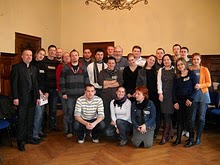
The
Class of 2010, Szczeczin Community Organizing Workshop
Under Ground
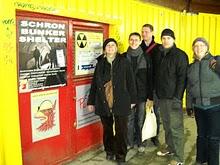
the
door to the tunnels under Szczeczin
Wawel Castle in Krakow
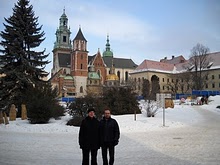
Lindsay
and Kajo
Shadows
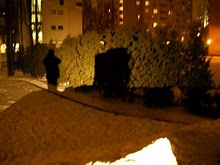
at
the site of the fighters' death
Meeting
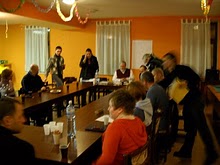
Church
basement in Slovakia
Meeting Prep
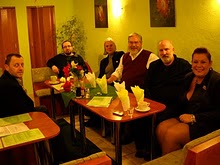
Zvolen
Our Hosts:
ECON the European Community Organizing Network - http://www.communityorganizing.eu/
Center for Community Organizing - Slovakia http://cko.sk/
Poland's website - English (less interesting!) - http://www.lgo.pl/english/index.php
